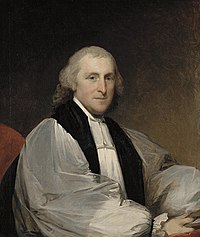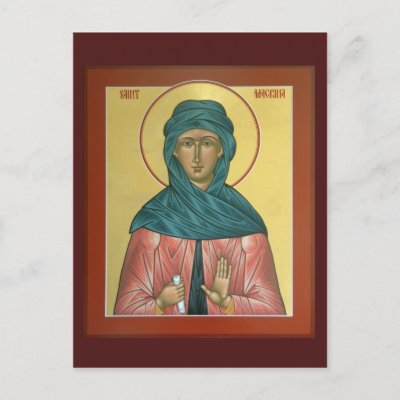William White [1747-1830], first Bishop of Pennsylvania, second bishop to be consecrated in the Episcopal Church of the United States. He was also the first chaplain of the US Senate and the author of the Episcopal Church's constitution, which is still in use to this day. From the forward to this historic document:
 The power of electing a superior order of ministers ought to be in the clergy and laity together, they being both interested in the choice. In England, the bishops are appointed by the civil authority, which was a usurpation of the crown at the Norman conquest, but since confirmed by acts of parliament. The primitive churches were generally supplied by popular elections; even in the city of Rome, the privilege of electing the bishop continued with the people to the tenth or eleventh century, and near those times there are resolves of councils, that none should be promoted to ecclesiastical dignities, but by election of the clergy and people. It cannot be denied that this right vested in numerous bodies, occasioned great disorders; which it is expected will be avoided, when the people shall exercise the right by representation.
The power of electing a superior order of ministers ought to be in the clergy and laity together, they being both interested in the choice. In England, the bishops are appointed by the civil authority, which was a usurpation of the crown at the Norman conquest, but since confirmed by acts of parliament. The primitive churches were generally supplied by popular elections; even in the city of Rome, the privilege of electing the bishop continued with the people to the tenth or eleventh century, and near those times there are resolves of councils, that none should be promoted to ecclesiastical dignities, but by election of the clergy and people. It cannot be denied that this right vested in numerous bodies, occasioned great disorders; which it is expected will be avoided, when the people shall exercise the right by representation.O Lord, who in a time of turmoil and confusion raised up your servant William White, and endowed him with wisdom, patience, and a reconciling temper, that he might lead your Church into ways of stability and peace: Hear our prayer, and give us wise and faithful leaders, that through their ministry your people may be blessed and your will be done; through Jesus Christ our Lord, who lives and reigns with you and the Holy Spirit, one God, for ever and ever.
July 19th:

Basil the Great, whose feast day is on June 14th, is thought to be the father of monasticism in the Eastern Christian Church. His brother, Gregory of Nyssa [March 9th], is recognized as one of the leading theologians of the early church. Sometimes overlooked is their big sister, Macrina, the founder of the first order of nuns in the Eastern Church, and the sibling who raised her brothers and instilled in them a love of Christ and a nimble manner of expressing that love verbally; not to mention a sense of industry when it came to the performance of good works. Her birth date is unknown, but she died sometime around the year 379.
Merciful God, who called your servant Macrina to reveal in her life and her teaching the riches of your grace and truth: Mercifully grant that we, following her example, may seek after your wisdom and live according to her way; through Jesus Christ our Savior, who lives and reigns with you and the Holy Spirit, one God, for ever and ever.
July 20th:
A number of years ago, the PTB* of the Episcopal Church realized that not enough women or people of color were represented on the calendar of feast days. As is often the case, the rectification was done in a hurried and [surprise!] politicized manner, resulting in days such as this one, where a convenient historical [and secular] event serves as the platform to capture the contributions of four individuals, all of whom get plunked down on one date. While I find the relationship to the Episcopal Church rather tenuous in the case of two of today's honorees, I do know that the other half of today's feast were communicants of the same small parish in upstate New York.
July 20th is the anniversary of the Women's Rights Convention held in Seneca Falls, New York in 1848. It is considered by many scholars [and by the young woman in my household who has a minor in Women's Studies from William Smith College] to be the formative moment in American feminism. One of the reasons that Seneca Falls was the site of this conference is that it was the hometown of Cady and Bloomer; both of whom were members of Trinity Episcopal Church in Seneca Falls.
There are many sources with information about Sojourner Truth and Harriet Tubman, both of whom have inspiring life stories. Likewise Amelia Bloomer, who was a popular public speaker, especially when she would appear in churches to discuss her underpants [or "bloomers"]. She was also a committed missionary of the frontier.
From a scholarly point of view, Elizabeth Cady Stanton was perhaps the most interesting, as she may have been the first "progressive" in the Church to use her religion mainly as a platform for political commentary. As we now live in an era when even sermons are to be judged more for their political correctness than for fealty to developed Christian thought, this historical addition to common discourse is worth noting.
[I say this chiefly because I was a seminarian during the Church's most politically guilty period and was privy to well over 100 sermons preached from the seminary chapel's pulpit, only two of which I remember were actually about Jesus. One sermon was entirely about the preacher's daughter's battle with drug addiction. A compelling and sympathetic story, certainly, and one that I thought would be worth putting into context with the salvation offered by the resurrected Christ. Apparently, the preacher did not agree and never did mention Our Lord in his entire oration.
Later in my career, when I was responsible for a staff of four other clergy, one of the associate priests would, in essence, preach the New York Times Op/Ed page. He called it a sermon because he sprinkled two or three references to God into it. God, mind you, never Jesus.]
Anyway, there are many, many sources of information about these women and their stories should be known. Certainly, we should always remember such visionaries in our prayers:
O God, whose Spirit guides us into all truth and makes us free: Strengthen and sustain us as you did your servants Elizabeth, Amelia, Sojourner, and Harriet. Give us vision and courage to stand against oppression and injustice and all that works against the glorious liberty to which you call all your children; through Jesus Christ our Savior, who lives and reigns with you and the Holy Spirit, one God, for ever and ever.* Powers That Be